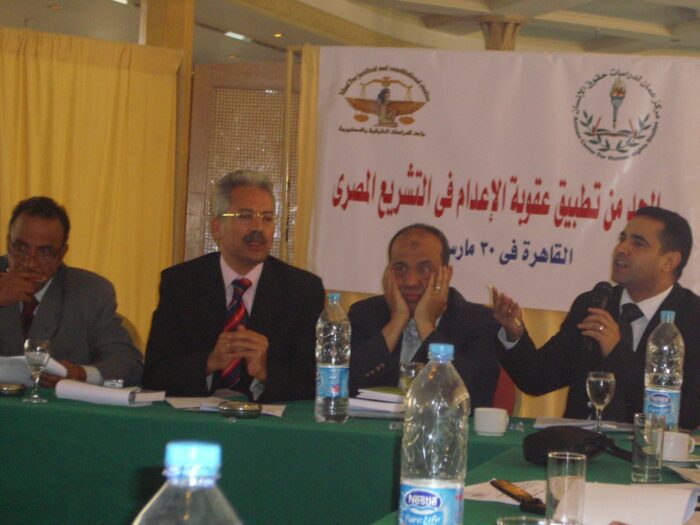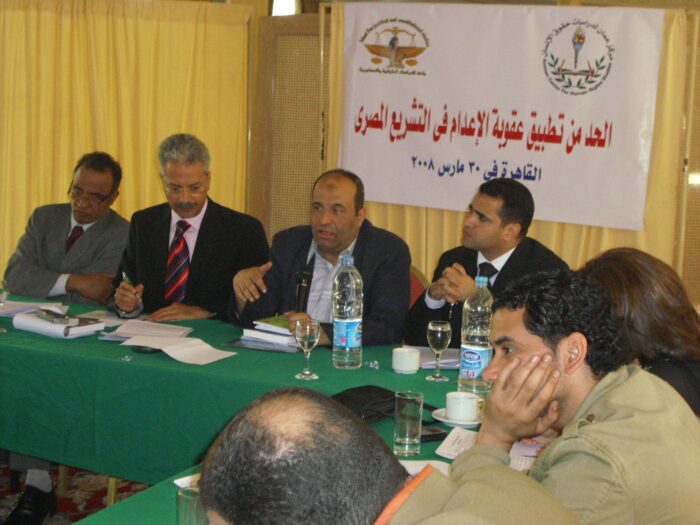Judges and Jurists demanded Limiting the Application of Death Penalty.
Within the framework of the activities of the Maat Center for Human Rights and Constitutional Studies aimed at legalizing the use of the death penalty as a punitive method, the center, in cooperation and coordination with the Amman Center for Human Rights Studies, held a workshop on Sunday March 30, 2008 on the ship Imperial in Zamalek under the title (limiting the application of the death penalty in Egyptian legislation)
Number of judges, jurists, representatives of Egyptian parties, and a representative of Amman Center for Human Rights Studies participated in the workshop.
At the beginning of the workshop, Professor / Ayman Aqil, Director of Maat Center for Legal and Constitutional Studies, explained the development that took place in the civil society movement in Egypt to limit the application of the death penalty, which resulted in the establishment of the Egyptian Coalition Against the Death Penalty, which participates among nine Arab countries in the regional coalition to limit the application Punishment is confirmed that the workshop proposals and recommendations will be presented at the conference that will be held at the Swedish Institute in Alexandria on May 12, 2008 in cooperation between the Maat Center and the International Organization for Penal Reform and the Amman Center for Human Rights Studies in Jordan.
Aqeel explained in his speech that the death penalty has been used in some countries as a means to get rid of their political enemies, and therefore it is inconceivable that defending human rights is justified by some in attacking the rights of others, especially in light of the fact that the death penalty is the only punishment that cannot be corrected if a mistake is made. Proved the innocence of the person who carried out the punishment
Aqeel pointed out that the aim of punishment is deterrence and reform, not revenge and revenge, which is confirmed by international covenants that demanded the reduction of punishment and the reduction of its use, which is what some Arab countries seek to achieve, such as Tunisia, Palestine, Algeria, Lebanon and Morocco that have stopped issuing death sentences since 1993. In various cases.
As for Egypt, Aqeel indicated that there are two parties, one of which supports retaining the punishment as a means of restraining and establishing safety in society, which is what called three members of the People's Assembly to demand that the application be carried out in the street, and on the other hand, the other party that demands the abolition of the punishment relied on the possibility of deceiving the judge with evidence and evidence It can be questioned, just as the social contract between the citizens and the government is based on the mandate to act on the benefit of the citizens and not the loss of their lives.
Mr. Manhal Al Saeeda, representative of Amman Center for Human Rights Studies, talked in his speech about he center's experiences in the field of the Arabic Alliance to Challenge Death Penalty ,which has local forms in Jordon, Oman, Morocco, Egypt, Palestine, Lebanon. Mr. Manhal explained that one of the alliance's aims is to assure the direction to different Arab countries to include them in some studies to measure the effect of death penalty application in achieving determent and restraining and another studies around substitute punishments in the case death penalty is cancelled. He also asserted the important role of civil society organizations in achieving this role demanded to protect human rights in different Arab countries.
Dr. Essam Al Feqi, discussed in his paper the argument raised by death penalty in all levels asserting that the Pharaoh Egypt is the first country in history that cancelled death penalty and substituted it with exile and hard work in workings for public interest. He criticized the Egyptian situation, announced in the United Nations' Public Assembly, that it refused stop death penalty. Al Feqi also asserted that he refused the justifications mentioned by the Egypt representative in United Nations to justify his refuse for stopping death penalty as he said that it is a mean to achieve determent and justice and to limit vengeance spirit asserting that deleting death penalty regarded as a contradiction to Islamic Legislation.
In his paper, Dr. Imad Al-Fiqi discussed the controversy raised by the death penalty at all levels, stressing that Pharaonic Egypt is the first country in history to abolish the death penalty and replace it with exile and hard labor in work that belongs to
In the public interest, criticizing Egypt's position announced in the United Nations General Assembly of its refusal to suspend the death penalty, and Al-Fiqi emphasized his rejection of the justifications put forward by the representative of Egypt at the United Nations to justify his refusal to suspend the punishment as it is a means to achieve justice and reduce the spirit of revenge. Islamic.
Al-Fiqi refuted these justifications, which he saw as unconvincing, considering that it is a difficult punishment to correct the error in applying it, in addition to its effect on achieving general deterrence in great doubt, citing that countries that abolished the death penalty did not witness an increase in the percentage of crimes that required it.
With regard to the contradiction of the abolition of the death penalty with Islamic law, Al-Fiqi clarified that execution is not a punishment in Islam except in three cases: adultery, premeditated murder, and the crime of warring action.
Al-Fiqi moved to punishment in modern legislation, stressing that he is against expanding its use, demanding the necessity of abolishing it in drug crimes and not using it as a rule in legislation, demanding that its application be limited to four or five crimes only, stressing that the guarantees established by the legislator are insufficient in terms of consensus among judges. It could be my opinion in the case of a strong head of department, and if the mufti saw a consultant that could not be taken, and that presenting the case to the Court of Cassation is not an advantage considering that everyone can resort to him in addition to the fact that the Court of Cassation is not an advantage considering that everyone can resort to him in addition to that The Court of Cassation is concerned with the trial of the judgment and not the re-trial of the convicted person again, as it is a court of law and not a reality.
Consultant Hesham Al Bastawysi, Court of Cassation's vice-president, said in commenting on the paper that the discussion is not done scientifically because we adopt an idea then we search for evidences to support it which is really a reversed logic. There is a mixing between legislation job and governance requires because changing society is not the legislation's aim but it is the aim of other bodies, he asserted. He regarded the matter as using legislation in the wrong place asserting that in Egypt there are many laws that were set for especial purpose, especially in punishment sides, so they never applied and they are denied by society for example, Cleanliness Law and Traffic Law.
Al Bastawysi asserted that what is applied in Egypt is not the Islamic Legislation but it is some bodies' notion about it, it is important to abide by Islamic Legislation or to leave it completely without selecting because Islamic Legislation gives the judge an unlimited freedom controlled by conditions to ensure his freedom and to prevent any interference in his personal affairs. Judge's task is to achieve justice not to apply law, as law regarded to be the mean to achieve justice, he added.
Al-Bastawisi explained that not only the Arab countries refuse to abolish the death penalty, but there are other countries such as Japan, China and East Asia that are more strict in refusing to abolish the punishment because of their beliefs. The rate of accusation and consulting the mufti, despite the possibility of non-compliance with it, is an opportunity for the judge to review himself and that the Court of Cassation is not a court of law as much as it is a guarantee of the availability of more expertise to hear the case.
Al-Bastawisi explained his rejection of the texts contained in drug crimes, stressing their negative impact on achieving justice, demanding that death sentences be codified and not abolished, and that it is necessary to remain present in cases of premeditated murder and stalking and cases of kidnapping and rape of a female because this is consistent with the culture of society in the death penalty in these cases. Lack of judgment may cause people to implement it themselves.
Al Bastawysi also called upon canceling death penalty in state security cases especially in those cases regarding spying or exchanging information with enemies in time of war. He ended his speech asserting that the problem is that there are some judges who were convinced by the state that their job is just to apply law so this cause many social problems.
In the second session Mr. Esam Sheeha, lawyer and member in the high institution in Al Wafd party, Mr. Hamdi Al Asyooti, lawyer and (freedoms secretary in Al Tagammoa party), and Mr. Ahmed Abd Al Hafeez, lawyer and (member of the political board in Naseri party) were talked. In this session, articles that set death penalty in the Egyptian law were discussed.
In the second session, Mr. Essam Shiha (the lawyer), a member of the Supreme Committee of the Wafd Party, Mr. Hamdi Al-Assiuti, the lawyer (Secretary of Freedoms in the Tagammu Party), and Mr. Ahmed Abdel Hafeez, the lawyer (member of the Political Bureau of the Nasserite Party) spoke in the second session. The articles contained in the Egyptian law that carry the death penalty were discussed.
At the end of the workshop, the participants agreed that the death penalty would remain in four cases: -
- Kidnapping a female and falling over to her without her will.
Murder crimes associated with premeditation.
High treason crimes.
Intelligence and espionage for the benefit of a foreign country in wartime.
It is important to review the other articles to cancel it, as it is an excess with no benefit, a session was formed of Mr. Ayman Oqeel, Mr. Esam Sheeha, and Mr. Hamdi Al Asyooti in order to form the final recommendations.
To view the working papers via the following links
Crimes stipulated for the death penalty in the Egyptian Penal Code
Justifications for abolishing the death penalty for some crimes in Egyptian legislation
shortlink: https://maatpeace.org/en/?p=32893


















